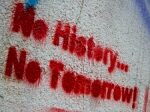The story is told that Napoleon was walking
through the streets of Paris one Tisha B'Av (the
saddest day of the Jewish year; when Jews mourn the destruction of the first
and second Temples).
As his entourage passed a synagogue he heard wailing and crying coming from
within; he sent an aide to inquire as to what had happened. The aide returned
and described seeing a synagogue full of Jews all sitting on the floor in dim
candlelight, chanting lamentations while shedding tears. Distraught, Napoleon
inquired about the terrible tragedy that had occurred. The aide replied that
they were mourning the destruction of their Temple. Napoleon was indignant! "How
come I wasn't informed? When did this happen? Which Temple?" The aide responded, "They
lost their Temple in Jerusalem on this date 1700 years ago."
Napoleon stood in silence and then said, "Certainly a people that have
mourned the loss of their Temple
for so long will survive to see it rebuilt!"
The Jewish people are a nation that has an incredible collective memory, one of
our most important qualities. This is evident in an interesting description of
the Jewish nation at the beginning of this week's Torah portion, Balak.
First, some background. Balak the Midianite king was desperate to harm the
advancing nation of Israel.
He understood that he could never beat them in battle, so he tried to hire
Balaam, the renowned non-Jewish sorcerer/prophet, to "curse" the
Jewish people. The Torah records King Balak's words: “Behold, a people has come
out of Egypt,
Behold! It has covered the surface of the earth... so now, please come and
curse the people for me, for they are too powerful!"
The Torah continues the story with Balaam responding that he first had to speak
to God before agreeing to Balak’s plan. God appeared to Bilaam and Bilaam said:
"Balak son of Zippor, King of Moab, said to me: ‘Behold, the people coming
out of Egypt
have covered the surface of the earth. Now go and curse them for me...’"
Eventually, God allowed Bilaam to go along, but warned him that only the words
that God spoke to him would be permitted to be uttered. In the end, instead of
cursing the Jews, Balaam gave them a beautiful blessing!
As you may have noticed, King Balak and Bilaam referred to the Israelites quite
differently. King Balak described the Israelites as a people who “came out of Egypt” - all
their miraculous experiences of salvation were safely in the past. They had
been slaves, but by now they were free men. On the other hand, Bilaam, who was
a prophet, depicted the Israelites as”coming out of Egypt” - a people who retained the
same heightened state of pride and excitement that they originally felt during
the Exodus. They were constantly reliving the miracles and revelations that
they had experienced, and were very much in touch with their roots and origins.
As Jewish people, we must always remember our roots; we cannot for a moment
take our history for granted. We Jews don't subscribe to the adage "the
past is history, the future is a mystery, and the present is a gift".
Instead, the Jewish nation always has its feet firmly planted in the present,
has an eye on the future, but never for a moment forgets its past As Bilaam
understood best, our present is a gift because of our past history.

No History No Tomorrow – Parshas Balak
